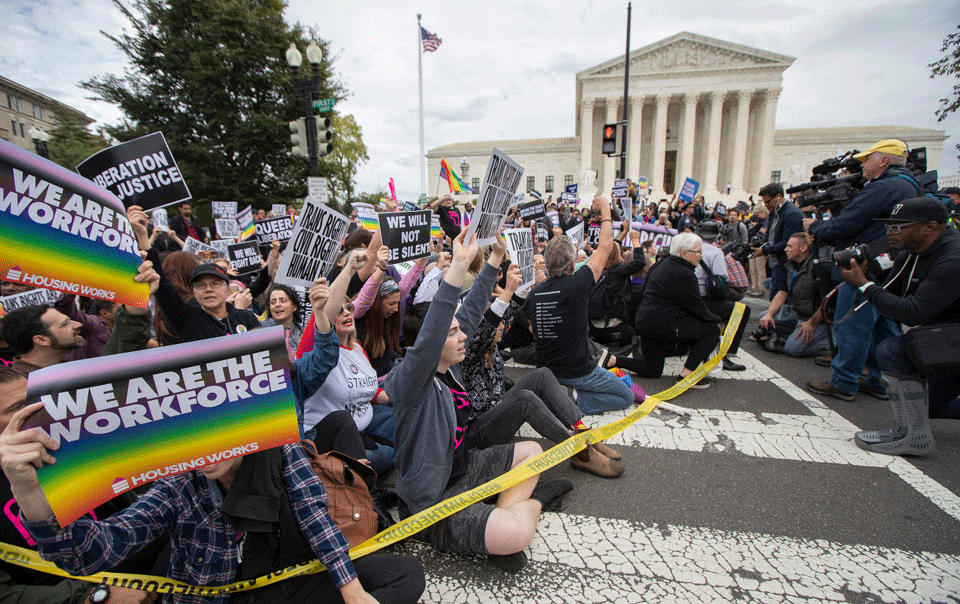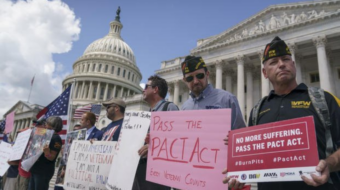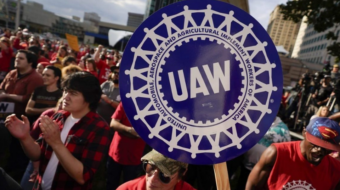
WASHINGTON—Winning at the U.S. Supreme Court, with its ban on job discrimination in the workplace is one thing, say LGBTQ federal workers. Changing hearts and minds, however, is quite another.
At least that’s what a group of them, convened by the Government Employees (AFGE) for a Zoom discussion, reported.
The union’s Women’s and Fair Practices Departments, run by National Vice President Jeremy Lannan, who is gay, hosted the session the day after the justices’ 6-3 ruling that Title VII of the landmark 1964 Civil Rights Act bans discrimination based on sexual orientation.
Trump-named GOP Justice Neil Gorsuch wrote the ruling in unusually plain language and based it on the law itself. He was joined by the court’s four progressive justices and GOP-named Chief Justice John Roberts in a major win in the long battle by LGBTQ people for equal rights. Coming out before that was difficult, the workers said. Sometimes, it still is.
“Engagement with my union fed my soul, but many people weren’t understanding,” said Ginger Hemingway, a retired civilian defense worker and member of Local 2433 in California. She came out as a lesbian in 1978, “when it was more of a political statement” than it is now.
She still remembers one official then saying her request for a security clearance could be denied – and she could be fired – because she was gay. Hemingway’s reply was, “You can fire me for other reasons, but if you do so on this one,” human rights lawyer “Gloria Allred will have a field day.” Hemingway got her clearance.
Her early decision to come out paved the way for others to do so, she added.
Coming out can be more fraught, depending on where you live, says Local 1858 member Tamar Alexis Lusardi, who is transgender – and who works at the military’s Redstone Arsenal in Huntsville, Ala. Lusardi had to bring at least five charges for unequal treatment, including one pending right now.
“Being in Alabama, I’ve had to get even union folks to understand what’s going on,” Lusardi said. “There was a lot of hatred from people who didn’t understand” until Lusardi explained why the cases went to the federal Equal Employment Opportunities Commission, the agency charged with enforcing Title VII.
“We worked to make it a better union and a better workplace, and that’s my joy” through all the battles, Lusardi said. Outside contractors, whom the military often hires for civilian jobs – an issue which is a constant thorn in the side of AFGE – could be even worse, Lusardi said.
“I remember walking into a room for a presentation, and it was me” as the only federal worker “and the rest were contractors, and they all had bibles. So I told them, ‘Your bible is fine on your own time, but you can’t use it as a form of harassment,’” due to conservative Christians’ use of its anti-LGBTQ language. “Some people are never going to change.”
Like Lannan, Clare Czierwonka, a nurse and legislative-political coordinator for Local 2457 in Iowa City, Iowa, grew up in a Catholic family and initially attended parochial schools. She came out at 15, but due to family pressure “dated some very destructive men” until she found her present wife at age 30.
“Now all they [her parents] ask is, ‘Are we going to have grandkids?’” The answer: Yes. Both Czierwonka and her wife are pregnant and due within days of each other.
Her problem at the veterans hospital in Iowa City – which she says is a relatively liberal town – isn’t the staff. It’s some of the patients. When they ask about her weekend plans, for example, Czierwonka must decide how much detail to tell.
With some, she’s comfortable mentioning outings with her wife. “But with others, if I walk into their room and they’re watching Fox News, I don’t really tell them. Coming out never really ends,” Czierwonka said, in a remark Lusardi and others echoed.
At least Lannan and Czierwonka had families who accepted their gayness, however uncomfortably at first. But when his mother found out he was gay, said African-American Dennis Nichols III, a D.C. Superior Court police officer, she threw him out of the house and onto the capital city’s streets, on a rainy night, at age 15.
Nichols, who is also a musician, was sheltered and aided by colleagues. His mother reconciled with him three years later, after receiving a letter for him at her house. The letter said Nichols was graduating with honors from high school. He won honors at college, too.
“She was scared of what people would think about her upbringing of me,” said Nichols, whose Local 1456 represents some D.C. city workers. “I told her, ‘It’s not anything you or my father did.’ Now, she’s my #1 fan.”
Still, the union helped provide him “that safe space” to come out as “a Black, gay, law-enforcement officer,” Nichols said. So did his immediate supervisor in “a very masculine agency” who heard of the discrimination. “He wasn’t having any of that.”
Sometimes education can overcome ingrained attitudes, even in the union, added Shakina Givens, president of Local 554 in Atlanta, and a Transportation Security Officer, commonly called airport screeners.
Of her Atlanta mentor, “I heard her say a lot of things that were inappropriate,” Givens said since the mentor didn’t realize Givens is gay. But their relationship “allowed me to reach her and teach her…and change her mindset.”










